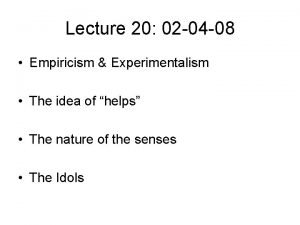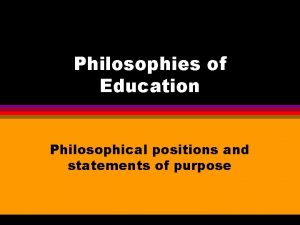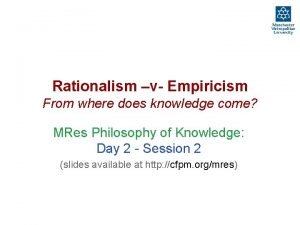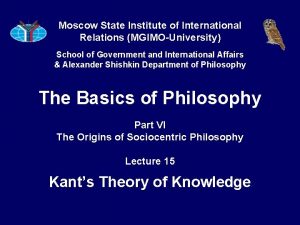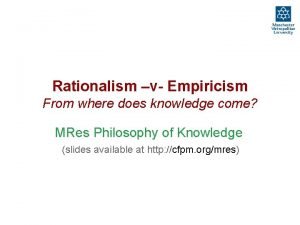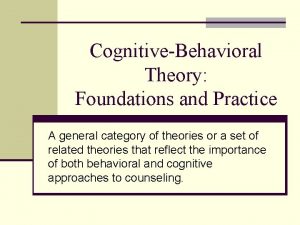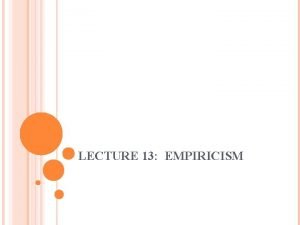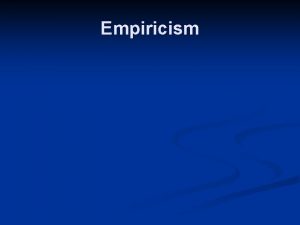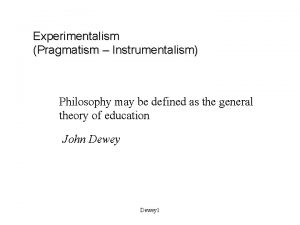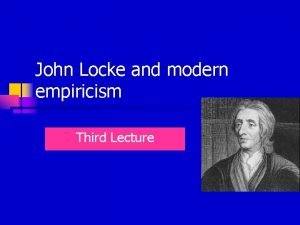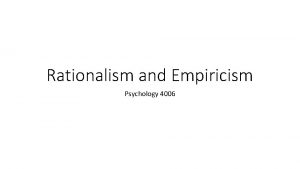Lecture 20 02 04 08 Empiricism Experimentalism The









- Slides: 9

Lecture 20: 02 -04 -08 • Empiricism & Experimentalism • The idea of “helps” • The nature of the senses • The Idols

Next 4: • • The study of nature with a view to works is engaged in by the mechanic, the mathematician, the physician, the alchemist, and the magician; but by all (as things now are) with slight endeavor and scanty success. VI It would be an unsound fancy and self-contradictory to expect that things which have never yet been done can be done except by means which have never yet been tried. VII The productions of the mind and hand seem very numerous in books and manufactures. But all this variety lies in an exquisite subtlety and derivations from a few things already known, not in the number of axioms. VIII Moreover, the works already known are due to chance and experiment rather than to sciences; for the sciences we now possess are merely systems for the nice ordering and setting forth of things already invented, not methods of invention or directions for new works.

Deduction / Induction • • • XIX There and can be only two ways of searching into and discovering truth. The one flies from the senses and particulars to the most general axioms, and from these principles, the truth of which it takes for settled and immovable, proceeds to judgment and to the discovery of middle axioms. And this way is now in fashion. The other derives axioms from the senses and particulars, rising by a gradual and unbroken ascent, so that it arrives at the most general axioms last of all. This is the true way, but as yet untried. XX The understanding left to itself takes the same course (namely, the former) which it takes in accordance with logical order. For the mind longs to spring up to positions of higher generality, that it may find rest there, and so after a little while wearies of experiment. But this evil is increased by logic, because of the order and solemnity of its disputations. XXI The understanding left to itself, in a sober, patient, and grave mind, especially if it be not hindered by received doctrines, tries a little that other way, which is the right one, but with little progress, since the understanding, unless directed and assisted, is a thing unequal, and quite unfit to contend with the obscurity of things.

IDOLS-Anticipations-Interpretations • From Eidos • XXIII • There is a great difference between the Idols of the human mind and the Ideas of the divine. That is to say, between certain empty dogmas, and the true signatures and marks set upon the works of creation as they are found in nature. • XXVI • The conclusions of human reason as ordinarily applied in matters of nature, I call for the sake of distinction Anticipations of Nature (as a thing rash or premature). That reason which is elicited from facts by a just and methodical process, I call Interpretation of Nature.

4 Idols • • • XXXVIII The idols and false notions which are now in possession of the human understanding, and have taken deep root therein, not only so beset men's minds that truth can hardly find entrance, but even after entrance is obtained, they will again in the very instauration of the sciences meet and trouble us, unless men being forewarned of the danger fortify themselves as far as may be against their assaults. XXXIX There are four classes of Idols which beset men's minds. To these for distinction's sake I have assigned names, calling the first class Idols of the Tribe; the second, Idols of the Cave; the third, Idols of the Market Place; the fourth, Idols of the Theater. XL The formation of ideas and axioms by true induction is no doubt the proper remedy to be applied for the keeping off and clearing away of idols. To point them out, however, is of great use; for the doctrine of Idols is to the interpretation of nature what the doctrine of the refutation of sophisms is to common logic.

Idols of the Tribe • The Idols of the Tribe have their foundation in human nature itself, and in the tribe or race of men. For it is a false assertion that the sense of man is the measure of things. On the contrary, all perceptions as well of the sense as of the mind are according to the measure of the individual and not according to the measure of the universe. And the human understanding is like a false mirror, which, receiving rays irregularly, distorts and discolors the nature of things by mingling its own nature with it.

Idols of the Cave • XLII • The Idols of the Cave are the idols of the individual man. For everyone (besides the errors common to human nature in general) has a cave or den of his own, which refracts and discolors the light of nature, owing either to his own proper and peculiar nature; or to his education and conversation with others; or to the reading of books, and the authority of those whom he esteems and admires; or to the differences of impressions, accordingly as they take place in a mind preoccupied and predisposed or in a mind indifferent and settled; or the like. So that the spirit of man (according as it is meted out to different individuals) is in fact a thing variable and full of perturbation, and governed as it were by chance. Whence it was well observed by Heraclitus that men look for sciences in their own lesser worlds, and not in the greater or common world.

Idols of the Marketplace • XLIII • There also Idols formed by the intercourse and association of men with each other, which I call Idols of the Market Place, on account of the commerce and consort of men there. For it is by discourse that men associate, and words are imposed according to the apprehension of the vulgar. And therefore the ill and unfit choice of words wonderfully obstructs the understanding. Nor do the definitions or explanations wherewith in some things learned men are wont to guard and defend themselves, by any means set the matter right. But words plainly force and overrule the understanding, and throw all into confusion, and lead men away into numberless empty controversies and idle fancies.

Idols of the Theatre • XLIV • Lastly, there are Idols which have immigrated into men's minds from the various dogmas of philosophies, and also from wrong laws of demonstration. These I call Idols of the Theater, because in my judgment all the received systems are but so many stage plays, representing worlds of their own creation after an unreal and scenic fashion. Nor is it only of the systems now in vogue, or only of the ancient sects and philosophies, that I speak; for many more plays of the same kind may yet be composed and in like artificial manner set forth; seeing that errors the most widely different have nevertheless causes for the most part alike. Neither again do I mean this only of entire systems, but also of many principles and axioms in science, which by tradition, credulity, and negligence have come to be received. But of these several kinds of Idols I must speak more largely and exactly, that the understanding may be duly cautioned.
